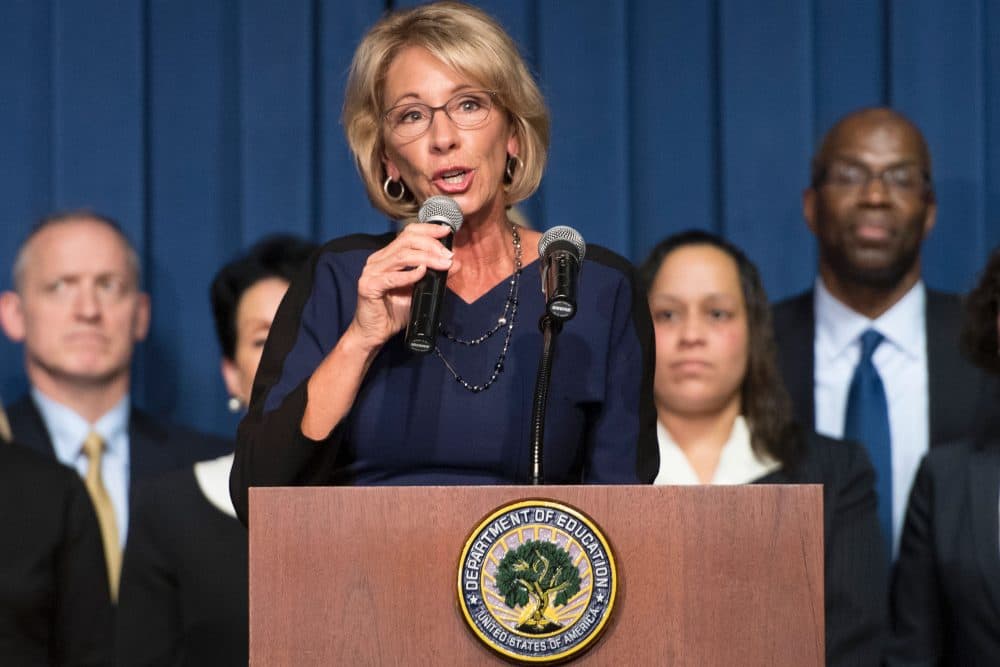Advertisement
Privatization In America
Why There's A Renewed Push To Privatize Public Education
Resume
President Trump and Secretary of Education Betsy DeVos are proponents of school choice. That includes publicly funded, privately managed charter schools and voucher programs, which give families money to pay tuition at private schools.
Advocates say school choice gives students and families a broader range of options when it comes to education. Critics say the programs undermine public schools.
Here & Now's Jeremy Hobson talks with Sam Abrams (@Samuel_Abrams), director of the National Center for the Study of Privatization in Education at Columbia University's Teachers College, about the push to privatize public education.
Interview Highlights
On the origins of privatizing public education
"We can go back to Milton Friedman with this. He wrote an important essay in 1955 called 'The Role of Government in Education,' and Friedman's argument was that parents should be able to shop for schools in the same way they shop for anything else, and use vouchers to do that shopping. And Friedman thought that this would help students in poor neighborhoods escape poor neighborhoods. He specified that the vouchers would be worth a certain amount of money, and private schools could charge more than that specified sum. But his concern, fundamentally, was improving the quality of education for all children, and giving parents more latitude."
On how much vouchers have caught on across the country
"Milwaukee is the city where this really began — it took a long time to catch on in the United States. So that started in 1990, there are about 28,000 students in Milwaukee. Across the country, we have programs in Cleveland, D.C., we have nearly 100,000 in Florida, and we have quite a few in Arizona now. The number of students using vouchers, however, is not that great. The alternative form of choice has really been charter schools, which were much less controversial in the public eye than vouchers."
On advocates who say vouchers and charter schools give parents more choice
"It does. It does give parents more choice. The big question is, does it provide choice for better education? Or is it just a different door that students are going through, but the education isn't necessarily better — and sometimes might be inferior — than what students would get at their default neighborhood public school."
On whether privatization in education makes public schools worse
"There is an argument to be made in that regard, because what we have happening is a certain kind of atomization. The neighborhood isn't the neighborhood that it once was, because you have students crossing school districts to go to different schools. So the community involvement in the neighborhood public school has been lost.
"Moreover, because we have this sorting of good schools and so-called 'bad schools,' with a lot of the students who can abide by the high academic and behavioral expectations at the demanding charter schools, then you have students who can't abide by those high academic and behavioral expectations, and get concentrated in the default neighborhood public schools. And we do have research that shows that, when you have that concentration, they cause problems for other kids."
"It does give parents more choice. The big question is, does it provide choice for better education?"
Sam Abrams, on school choice
On whether testing in schools is a byproduct of privatization
"I wouldn't say the testing itself is a product of privatization. This was mandated by the federal government, with No Child Left Behind in 2002, and we had a lot of states who are mandating this kind of testing a decade earlier. And you do have these companies who not only benefit from this mandated testing, but they also manufacture need with a lot of benchmark assessments throughout the year to prepare students for these exams. I see the testing, though, as a product not so much of privatization, but of this commercial mindset. And then we like to think of everything in terms of profits and losses, and reading and math scores comport with that vision of how schools work, as any aspect of our economy works."
On Secretary of Education Betsy DeVos and the future of privatization in public education
"Well, from her visit to a Catholic school with Donald Trump in Orlando several weeks ago, we know that she's a big fan of tuition tax credits, which become vouchers for poor children. So she can lobby for that. How she can make it happen at the federal level is another question. There isn't that much money in the federal budget for education. So it's a bit of a mystery about how she can really make privatization take that much more hold across the country."
"Much can happen without her, and that's already happened recently in Arizona. We have a push in Nevada that's in the court system right now about making money available to all parents regardless of income so they can send their children to private school. And it may be the case that this will spread to other states. It seems to be the case."
This article was originally published on May 09, 2017.
This segment aired on May 9, 2017.